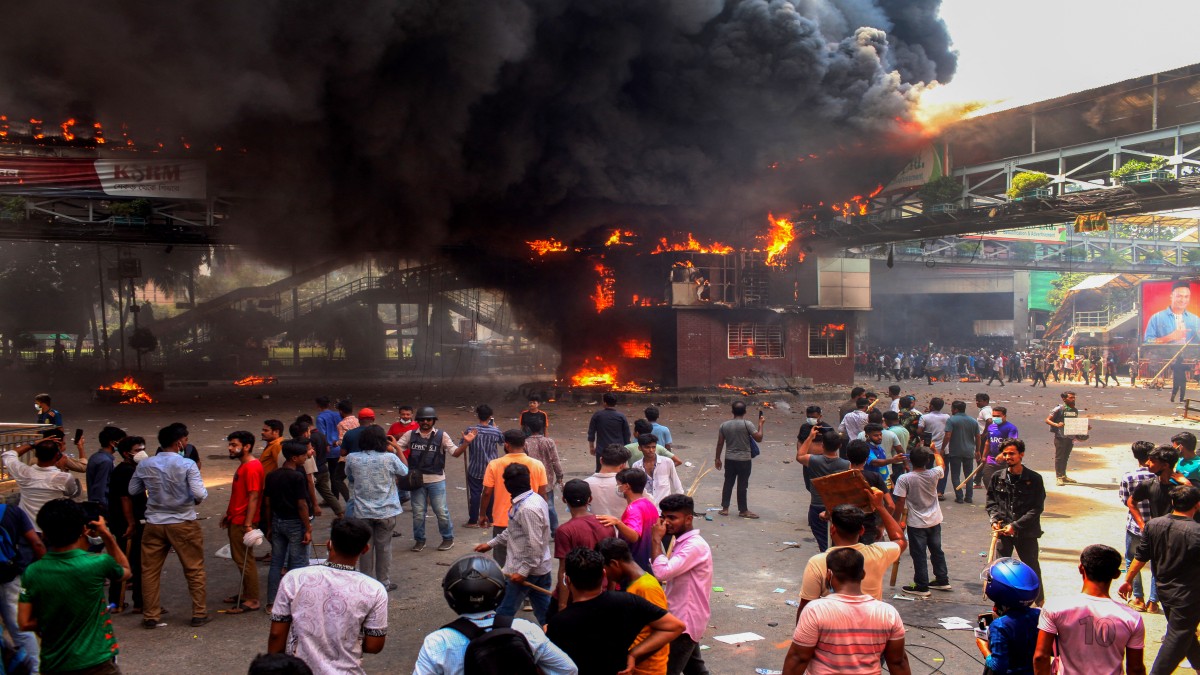Jobs
Jobs, economy, China: The real reasons behind Bangladesh anti-quota protests
)
At least 39 people have died in Bangladesh’s anti-quota protests that erupted on July 1. But this is not the first stream of protests that sought to end quotas in Bangladesh government jobs. University students had taken to the streets in 2018 as well as months before Bangladesh was to vote in a national election in 2019. Back then, Prime Minister Sheikh Hasina adopted a more conciliatory approach scrapping the quota for the children of Bangladesh’s Liberation War veterans.
This time, protests have erupted six months into her re-election for a record fourth-term. And this time, she had adopted a stern approach to deal with the protesters. She has dubbed them as “Razakars” — a term hitherto synonymous with “anti-nationals” in Bangladesh. Literally meaning volunteers in Arabic, “Razakars” is a pejorative term in Bangladesh as it refers to those who sided with the Pakistan military during the country’s armed struggle for independence in 1971.
Now, the word seems to be acquiring a new meaning in anti-quota protests in Bangladesh.
Why this Bangladesh agitation is different from 2018’s protests
Frustrated with continued protests, Hasina on July 14 remarked, “Why do they [the protesters] have so much resentment towards the freedom fighters? If the grandchildren of the freedom fighters don’t get quota benefits, should the grandchildren of Razakars get the benefit?”
To put more context to Hasina’s comment, it’s helpful to recall that this was her first press conference after she returned from China — let’s rephrase it, after she returned home, cutting short her China visit by a day amid reports that she was upset with the Chinese leadership over economic package deal. We will return to China’s connection a little later.
But this comment by Hasina seems to have galvanised anti-quota protesters. The same night, thousands of students marched on the Dhaka University campus and Bangladesh capital’s major stress. Women students joined the protesters in large numbers. Before midnight, protesters were chanting slogans, repurposing the term Razakar to denounce Hasina — “Who am I? Who are You? Razakar, Razakar. Who said that? Who said that? Autocrat. Autocrat.”
This was not the fervour of the protests that led to the scrapping of the quota for the children of Liberation War heroes. Hasina’s father Sheikh Mujibur Rehman and their Awami League party were at the forefront of the Liberation War. Many believe that the quota system helps Hasina supporters and that is why she has been reluctant to scrap it for a merit-based recruitment policy.
High unemployment, less jobs: The source of Bangladesh protests
The source of these protests is a hiring system that Bangladesh adopted in 1972, soon after its liberation from Pakistan. The role of the war veterans was acknowledged by reserving seats for their children.
Under the quota system, 30 per cent of government jobs are reserved for the descendants of Bangladesh’s freedom fighters. This is not all reserved seats.
Currently, 56% of government jobs are reserved — including 10 per cent for applicants from backward districts, 10 per cent for women, five per cent for ethnic minorities, and one per cent for aspirants with physical disabilities.
The trigger to the current wave of protests came from a high court order in June-end. Petitioners, representing the children of the war veterans, had challenged the Hasina government’s order to scrap the job quota in 2021. The high court in its order restored the job quota for the descendants of the war veterans, immediately triggering protests.
On July 10, Bangladesh’s Supreme Court suspended the order for a month. The top court will hear the matter on August 7. So, technically, the job quota for the children of war veterans is not applicable currently in Bangladesh but protesters are demanding an executive order from the Hasina government stating that the policy to reward the third generation of war veterans would be replaced by a merit-based hiring system.
To give a sense of the competition for government jobs — highly coveted in the Indian subcontinent, thanks to British colonial legacy — there are around 400,000 job-seeking graduates in Bangladesh for about 3,000 government jobs a year.
Until Bangladesh fixes its employment structure, there will likely be a huge volume of university pass-outs looking for jobs and forced to stay unemployed or under-employed. The job situation has become complicated in recent times due to the struggle that Bangladesh’s economy has been going through, especially after Covid-19 pandemic.
Economy: Declining growth amid delayed reforms
Bangladesh is facing mounting economic challenges now, starkly different from its robust growth trajectory of previous years. The aftermath of the Covid-19 pandemic, coupled with global economic uncertainties including the Russia-Ukraine conflict, has left the nation grappling with significant setbacks.
The country’s GDP growth has slowed notably, falling to 5.8 per cent in fiscal 2023 from a previous high of 7.1 per cent in 2022. When protests were happening in 2018, the growth rate was 7.9 per cent.
Bangladesh’s foreign reserves was about $42 billion during 2018. Now, it has declined to around $26.5 billion.
Moreover, inflation surged, reaching alarming levels around 9.7 per cent by mid-2024. This economic downturn has been exacerbated by widespread corruption scandals implicating high-ranking officials, further eroding public trust and economic stability.
Only recently, the Bangladesh press was filled with revelations of retired Inspector General of Police Benazir Ahmed’s black money and vast assets. Hasina herself said earlier this month that she dismissed one of her aides for illicitly amassing 4 billion Bangladeshi takas ($34 million). This comes against the backdrop of the youth scampering for viable employment options.
Rising debt burden: The typical China loan syndrome
Bangladesh’s fiscal challenges are compounded by its substantial debt burden, primarily attributed to extensive infrastructure projects financed through loans, notably from China’s Belt and Road Initiative.
While these initiatives aimed to stimulate growth, they have raised concerns about sustainability and long-term financial obligations. Bangladesh’s economic woes are intertwined with its growing dependence on foreign loans, notably from China, to fund critical infrastructure projects.
These initiatives have bolstered economic development aspirations but have also burdened the nation with substantial repayment obligations. These are reflected in Bangladesh’s debt-to-GDP ratio of approximately 36.4 per cent. Chinese loans have wreaked havoc in several economies including Sri Lanka in South Asia and a host of African countries.
Bangladesh has been wary of the nature of Chinese loans that come in the name for infrastructure development but with preconditions like which Chinese companies will be involved in the projects and also that the loanee country has to deposit some guarantee money in an escrow account to secure China’s loan.
Hasina’s recent visit to China did not go as expected. Bangladesh had anticipated substantial financial support, including some relaxations in debt repayment. Additionally, Bangladesh hoped to secure a $5 billion loan that could re-energise its economy. Instead, over the three days of talks and negotiations, Hasina could get China to consent for a financial assistance of just about $137 million.
She returned home on July 10, a day ahead of the conclusion of her four-day Beijing visit. It’s not clear what curtailed her trip — was it the ongoing protest or her disappointment with the Chinese leadership, as media have reported.
The shift in financial dynamics, exacerbated by global economic volatility, the complexities of managing external debt and its implications for national economic policy, Bangladesh provided a fertile ground for a protest movement by job seekers. It was a matter of when, not if. Her political rivals have only exploited the conditions — rising unemployment among youth, and a looming brain drain — to keep Bangladesh’s economic landscape precarious.










